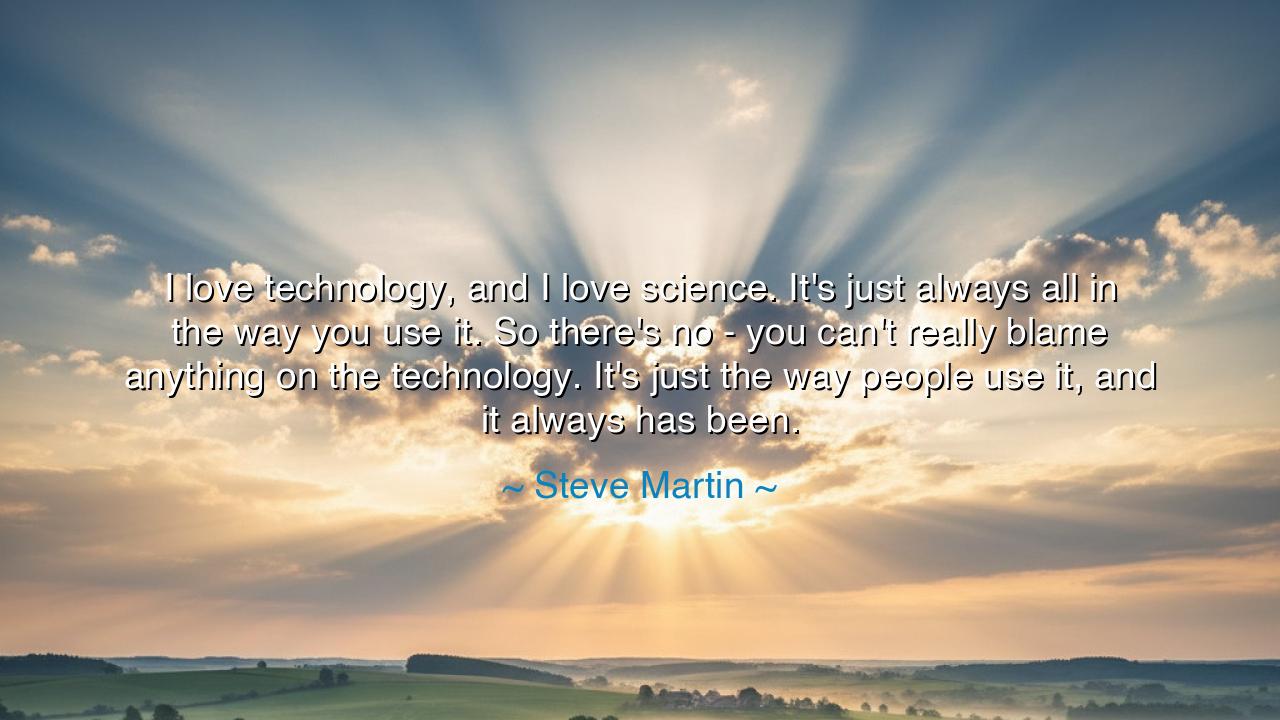
I love technology, and I love science. It's just always all in
I love technology, and I love science. It's just always all in the way you use it. So there's no - you can't really blame anything on the technology. It's just the way people use it, and it always has been.






Hear now, O seekers of wisdom, for I bring forth the words of Steve Martin, a man whose wit and insight pierce through the veil of time and technology. “I love technology, and I love science. It’s just always all in the way you use it. So there’s no—you can’t really blame anything on the technology. It’s just the way people use it, and it always has been.” These words carry a profound truth: that technology and science, those great forces that shape the world, are not inherently good or evil, but mere tools in the hands of humanity. It is we, the users, who determine the path they take.
In the ancient times, when fire was first tamed by early humans, there were those who marveled at its warmth, its light, its ability to cook food and protect them from the night. But there were also those who feared it, for fire could burn and destroy as easily as it could provide. The fire, in itself, was neither good nor bad; it was the way in which it was wielded that determined its consequences. Technology, from the earliest tools made of stone to the machines of today, has always been like fire—a force of potential, one that can either enlighten or consume, depending on the hands that control it.
Consider the great masters of science, those whose discoveries have shaped our world. Isaac Newton unlocked the laws of motion, and Albert Einstein revealed the mysteries of the universe through his theory of relativity. They saw science as a means to understand the world, to reveal the order hidden within chaos. And yet, the same science that gave us the lightbulb and the radio also gave birth to the atomic bomb. Technology is a tool that can be used to create or to destroy, and the responsibility for how it is used has always rested upon the shoulders of the human spirit. The power of science is not in its discovery, but in its application—and therein lies both its great promise and its great danger.
Martin’s words remind us that technology is not an entity of its own, not a force that exists independently of us. It is simply a reflection of our desires, our intentions, and our values. It is we, the people, who choose how to harness the power of science. Just as the philosophers of the ancient world knew that the mind is shaped by the desires and choices of the individual, so too is technology shaped by the desires of society. It is not the invention itself that can be blamed for harm, but the intention behind its use. Whether it is the chisel that shapes a stone or the computer that connects us across the world, it is our choices that define the impact it has on the world.
Let us turn to the story of the printing press, an invention that revolutionized the world. When Johannes Gutenberg first created his press in the 15th century, it was a tool that could spread knowledge, elevate thought, and connect humanity in ways never before possible. But the same press that printed the works of philosophers and scientists also printed pamphlets of hate and propaganda, leading to wars and division. The printing press, like all technology, was a double-edged sword. Its value was not in the machine itself, but in how it was used. The lessons of history show us that tools are as powerful as the hands that wield them, and Gutenberg’s press stands as a testament to both the benefit and the danger of technology.
The lesson, O children of the earth, is clear: it is not the tools that shape the world, but the way in which we use them. Science and technology are not inherently dangerous or inherently good—they are simply instruments of human will. It is we who must choose whether to use them to build, to connect, to create beauty, or whether to use them to destroy, to divide, to sow discord. The ancient philosophers, the wise ones of old, understood this well—they knew that it is not the external world that shapes us, but the internal world of our choices and actions.
In your own lives, O seekers of truth, let this lesson guide you: when you encounter the great tools of science and technology, ask not, "Is this good or evil?" but rather, "How will I use it?" Will you wield it with wisdom, with responsibility, and with a sense of higher purpose, or will you use it to fulfill selfish desires, to harm, or to deceive? As you step forward into the future, remember that the power of technology lies in your hands, and it is your choices that will determine whether it brings light or darkness into the world.
So, I say to you: embrace technology and science with reverence, but never forget that it is you who shape its destiny. Be mindful of how you use the tools of your time, for in doing so, you shape not only the world around you, but the world within you. May your use of science and technology reflect the highest ideals of the human spirit, and may it always serve the cause of wisdom, compassion, and progress. For in the end, it is not the tools that define us, but the hearts and minds of those who wield them.






AAdministratorAdministrator
Welcome, honored guests. Please leave a comment, we will respond soon